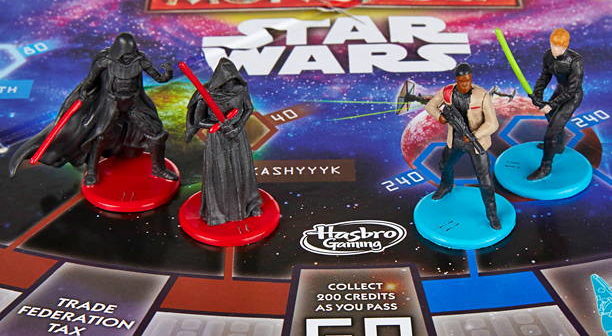It’s Monopoly night. Because nothing brings a family together like trying to drive each other to bankruptcy.
Unfortunately our Monopoly set is Star Wars themed, so while I try to set up the game, Joseph engages the pieces in a furious lightsaber battle, with Batman-style sound effects.
“Wha-poosh!” he cries, as Darth Vader skids across the board.
“No wha-poosh,” I tell him, picking up the scattered cards.
“Wha-pompom!”
One of the joys of parenthood is that as your children get older, they become lawyers, picking through every word you say for loopholes.
“No wha-pompom either.”
“Lanko! Dondy! Triple somersault dive!”
Finally order is restored, and the game begins.
“You owe me 26 credits rent,” Noah tells Joseph.
“Why?”
“Because you landed on my planet.”
“Why does that mean I owe you rent?” Joseph asks, not unreasonably. “I don’t live there.”
“Because that’s the way it is,” Noah says. “Make that 30 for arguing.”
Monopoly is instructive about money, in more ways than one. Its forerunner, The Landlord’s Game, was designed by left wing radicals to warn people of the evils of capitalism.
“There are those who argue that it may be a dangerous thing to teach children how to get the advantage of their fellows, but let me tell you there are no fairer-minded beings in the world than our own little American children,” wrote its inventor Elizabeth Magie, optimistically. “Let the children once see clearly the gross injustice of our present land system, and when they grow up, the evil will soon be remedied.”
Capitalism struck back though. Unemployed heater salesman Charles Darrow stole the idea and sold it to Parker Brothers as his own invention. When Magie protested, she was paid USD 500 for the rights to her game. Magie was subsequently written out of the history of Monopoly, which was recast as a Depression-era rags to riches tale of American “can do” spirit. Darrow became a millionaire.
Back on the board, Noah has persuaded Joseph to sell him the Coruscant Senate (that’s Boardwalk or Mayfair to you traditionalists), and settlements have sprung up all over the planet. When Joseph touches down there, it’s game over for him. He happily returns to his lightsaber battles.
“Wha-schmoofah!”
I, however, know the secret of Monopoly. It’s not flashy Boardwalk that wins you the game, but another, apparently undistinguished set, which you can usually snap up without fuss. (No, I’m not telling you which one. I might play you some time.)
While Noah builds expensively on the dark blues, I gradually spread my grip across the board, and wear him down by degrees. He ends his days penniless in Mos Eisley, which is, as everybody knows, a wretched hive of scum and villainy.
So, boys, what have you learned from this game?
“Money is important,” Noah observes thoughtfully, “when it comes to buying things.”
“And never play games with Dad,” Joseph adds. “Because he always wins.”
Good. The evening has not been wasted.
This article originally appeared on page 41 of the September 2016 Issue of beijingkids magazine. Click here for your free online copy. To find out how you can obtain a hard copy, contact distribution@truerun.com.
Photo: ubergizmo.com




